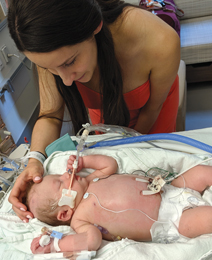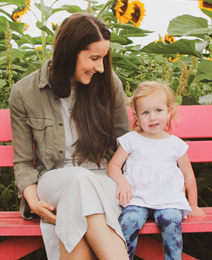How little fights big
Up until the day of Quinn’s birth in July 2019 in Victoria, BC, there had been no indications of anything out of the ordinary. Heather and Ryan, expecting a typical, low-risk birth, were excited to meet their first child and welcome her into the world.
During the delivery, Quinn’s heart rate suddenly dropped and didn’t recover as expected. It turned out that an extremely short umbilical cord had prematurely severed the flow of blood and oxygen, and when she emerged there were no signs of life.
CPR had to be administered for 13 minutes before Quinn’s heart rate started to return, but the damage was already done. Those vital 13 minutes led to damage in multiple organs, as well as hypoxic ischemic encephalopathy, a type of brain dysfunction.
Quinn was suffering from seizures and abnormal brain activity. She wasn’t able to breathe on her own, her liver wasn’t clotting properly, her kidneys weren’t functioning and she had a condition that caused her bowels to perforate.
“The hardest part for us was the shock of how quickly everything changed. We went from envisioning a life and a future for our daughter, to simply hoping she would survive.”
— Heather, Quinn’s mother
“The sickest baby in the hospital”
Medical staff worked tirelessly to stabilize her and on the fifth day of Quinn’s life she was flown from Victoria to BC Children’s Hospital. After examining her, Heather overheard one of the doctors saying plainly that Quinn was “the sickest baby in the hospital.”

Within hours of her arrival, Quinn was rushed into surgery. The BC Children’s medical team had to work quickly to save Quinn’s life.
The surgical team removed the dead portion of her bowel and created stomas, openings that allowed waste to leave her body so her intestines could recover. The lack of kidney function was the greatest threat to her survival, so Quinn was outfitted with a line in her neck to provide dialysis, which replicates the kidneys’ cleaning function.
Fortunately, the surgery was a success. The “sickest baby in the hospital” was, thankfully, on her way to giving up that label.
Care for the entire family
Quinn was transferred to the Hudson Family Pediatric Intensive Care Unit and spent almost two weeks fighting for her life while under 24-hour care.
On Quinn’s ninth day of life, her respirator was removed and Heather was finally able to hold her child. It was a complicated procedure—Quinn had to stay connected to multiple machines and equipment—but the nurses helped navigate so Heather could make that crucial connection.
“It meant everything to me to be able to have that emotion-filled first cuddle. It was quite a production of cords and lines and it took so many people to make it happen, but I had waited such a long time for this moment.”
—Heather, Quinn’s mother
In helping Heather hold her baby for the first time, the nurses and the rest of the medical staff were doing more than just fulfilling a mother’s desire to cuddle her newborn. With all the fear and trauma Heather and Ryan had endured over the past few days, the medical staff knew it was vitally important that the parents have a chance to connect with their new baby.
“I was very guarded in the beginning to build the connection with Quinn for fear that she wouldn’t survive,” Heather admitted. “But the nurses really brought us back to Quinn and supported us. It meant a lot to me that they picked up on what our family needed, and helped make it happen.”
The family was in the hospital for two months, and in some ways it almost felt like home—partially because of the calming spaces, but mostly because of the kind, caring team who supported them every step of the way.
Connecting to a brighter future

Three years later, Quinn is doing extremely well. Her kidney function has stabilized, and while she requires a gastrostomy tube, a tube inserted into the belly for feeding, it doesn’t stop her from being a spirited, energetic and rambunctious toddler.
The family still visits BC Children’s for regular annual check-ups, and the hospital teams go out of their way to foster a relationship not only with Quinn’s parents but with Quinn herself.
“They follow her medically,” Heather said, “but they also just seem to genuinely care about how she’s doing and want that personal connection with her, which is really nice to see.”
Small never gives up
The family recently celebrated Quinn’s third birthday. While Heather was watching the toddler giggling and running around the backyard, she couldn’t help but reflect back on the first two months of Quinn’s life with an overwhelming feeling of gratitude for the team at BC Children’s Hospital.
As a newborn baby, Quinn faced enormous challenges—unexpected complications so severe they threatened to take her life before it even started. But Heather’s newborn baby battled back with all the strength in her days-old body, and with the extensive care provided by medical experts at BC Children’s Hospital, Quinn fought and won. Proof that small can be mighty.
This article was originally featured in the Fall 2022 issue of Shine magazine.
